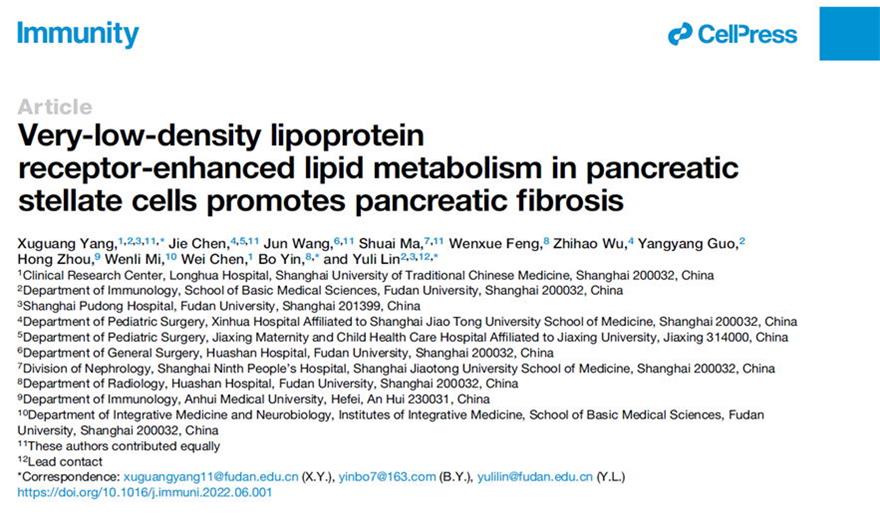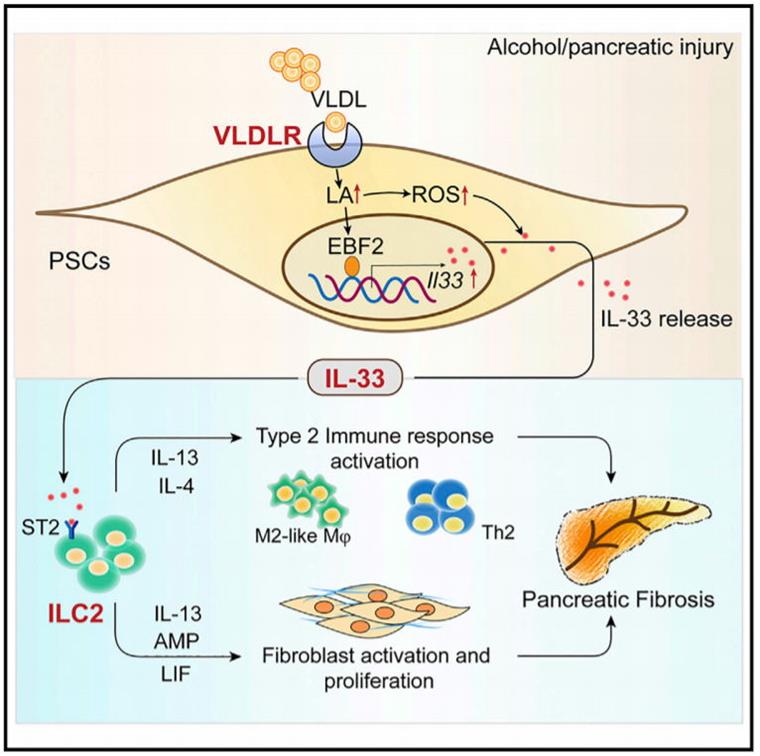Dr. Yuli Lin and Dr. Xuguang Yang’s groups revealed the mechanism of lipidprotein promoting PSC activation and pancreatic fibrosis during pancreatitis
Source:Yuli Lin
2022-07-11
Dr. Yuli Lin’s group from Shanghai Medical College of Fudan University and Dr. Xuguang Yang’s group from Longhua Hospital of Shanghai launched a cooperative study and published a research article in Immunity on June 22, 2022, entitled “Very-low-density lipoprotein receptor-enhanced lipoprotein processing of pancreatic stellate cells promotes pancreatic fibrosis through the IL-33/ILC2 axis”.

Chronic pancreatitis (CP) is a progressive fibroinflammatory disease, which is characterized by recurrent inflammation and extensive tissue fibrosis. Lipoprotein disorder is considered to be a common feature of CP, however, its involvement in pancreatitis fibrosis has not been clarified. This study focused on the regulation of lipid metabolites on pancreatitis and explored the role and mechanism of lipoproteins on the PSC activation and the subsequent up-regulation of type 2 immune response during chronic pancreatic fibrosis.
The study investigated the heterogeneity of PSCs in the CP tissue, and identified very-low-density lipoprotein receptor (VLDLR) as a marker of activated PSC subsets by Single-cell RNA sequencing. They found that oxidative stress-induced VLDLR expression on PSCs was responsible for the intracellular lipid aggregation of PSC and was important for the progression of pancreas fibrosis. The accumulated lipoproteins in PSCs were decomposed and further promoted IL-33 expression and release by activating transcription factor EBF2, inducing oxidative stress, and promoting endoplasmic reticulum stress in PSCs. PSC derived IL-33 activated group 2 innate lymphocytes (ILC2s) and triggered type 2 immune response in pancreatic tissue. Activated ILC2s can further induced PSC activation with positive feedback, which ultimately promoting the fibrosis progress of CP. In conclusion, this study highlighted the important role of lipoprotein metabolism on the activation PSCs and the induction of type 2 immune response during pancreatic fibrosis.

Very little is currently known about the role of lipid metabolites in the PSC activation and pancreatic fibrosis and this study makes a significant contribution to this. The findings provided new insights for improving the pancreatitis treatment by targeting the lipoprotein metabolism of PSCs or IL-33 release, which might have a clinical transformation significance.
Dr. Yuli Lin, Dr. Xuguang Yang and Dr. Bo Yin are the corresponding authors of this article. Dr. Xuguang Yang, Dr. Jie Chen, Dr. June Wang and Dr. Shuai ma are the co-first authors of this article. This work was supported by National Natural Science Foundation of China, National Natural Science Foundation of China's major research project, Innovative research team of high-level local universities in Shanghai-Clinical and basic research, Zhejiang Provincial Natural Science Foundation, Clinical Research Project of Health Industry of Shanghai Municipal Health Commission, and The Medical Heath Science and Technology Project of Zhejiang Provincial Heath Commission.
Links: https://www.cell.com/immunity/fulltext/S1074-7613(22)00239-4

Chronic pancreatitis (CP) is a progressive fibroinflammatory disease, which is characterized by recurrent inflammation and extensive tissue fibrosis. Lipoprotein disorder is considered to be a common feature of CP, however, its involvement in pancreatitis fibrosis has not been clarified. This study focused on the regulation of lipid metabolites on pancreatitis and explored the role and mechanism of lipoproteins on the PSC activation and the subsequent up-regulation of type 2 immune response during chronic pancreatic fibrosis.
The study investigated the heterogeneity of PSCs in the CP tissue, and identified very-low-density lipoprotein receptor (VLDLR) as a marker of activated PSC subsets by Single-cell RNA sequencing. They found that oxidative stress-induced VLDLR expression on PSCs was responsible for the intracellular lipid aggregation of PSC and was important for the progression of pancreas fibrosis. The accumulated lipoproteins in PSCs were decomposed and further promoted IL-33 expression and release by activating transcription factor EBF2, inducing oxidative stress, and promoting endoplasmic reticulum stress in PSCs. PSC derived IL-33 activated group 2 innate lymphocytes (ILC2s) and triggered type 2 immune response in pancreatic tissue. Activated ILC2s can further induced PSC activation with positive feedback, which ultimately promoting the fibrosis progress of CP. In conclusion, this study highlighted the important role of lipoprotein metabolism on the activation PSCs and the induction of type 2 immune response during pancreatic fibrosis.

Very little is currently known about the role of lipid metabolites in the PSC activation and pancreatic fibrosis and this study makes a significant contribution to this. The findings provided new insights for improving the pancreatitis treatment by targeting the lipoprotein metabolism of PSCs or IL-33 release, which might have a clinical transformation significance.
Dr. Yuli Lin, Dr. Xuguang Yang and Dr. Bo Yin are the corresponding authors of this article. Dr. Xuguang Yang, Dr. Jie Chen, Dr. June Wang and Dr. Shuai ma are the co-first authors of this article. This work was supported by National Natural Science Foundation of China, National Natural Science Foundation of China's major research project, Innovative research team of high-level local universities in Shanghai-Clinical and basic research, Zhejiang Provincial Natural Science Foundation, Clinical Research Project of Health Industry of Shanghai Municipal Health Commission, and The Medical Heath Science and Technology Project of Zhejiang Provincial Heath Commission.
Links: https://www.cell.com/immunity/fulltext/S1074-7613(22)00239-4


